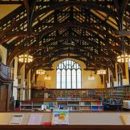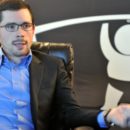Changes in communication technologies could mean the end of libraries as we know them. Or does it? Hampshire College opened in 1970 — heralding academic innovation. Library director Jennifer Gunter King says school founders wanted everything re-invented, including the library. Today, bolstered by a one-point-two million dollar grant from the Mellon Foundation, Hampshire’s re-tooling the library, again. and it’s not alone. many libraries are getting 21st century makeovers.
Caro Pinto’s a librarian at Mount Holyoke College. NEPR’s Susan Kaplan met her there, in the library, where they kept their voices down. That’s still the rule, even in this age of declining book circulation, Google Scholar and, well, Google Books. Something else that hasn’t changed: most people’s perception of the slightly old fashioned L word — librarian. Pinto says that includes her childhood librarian.

